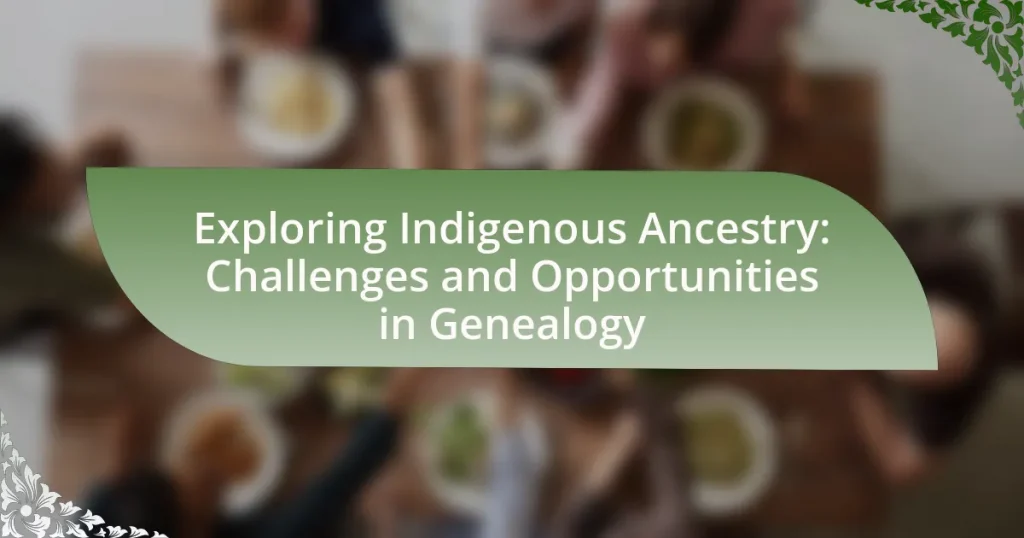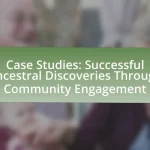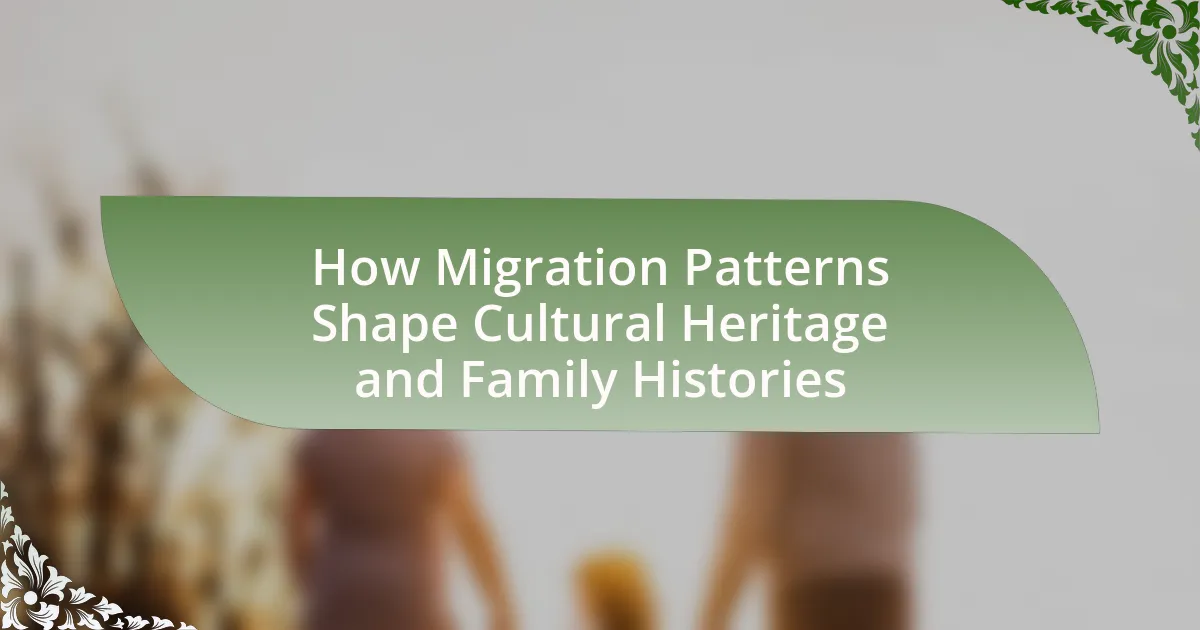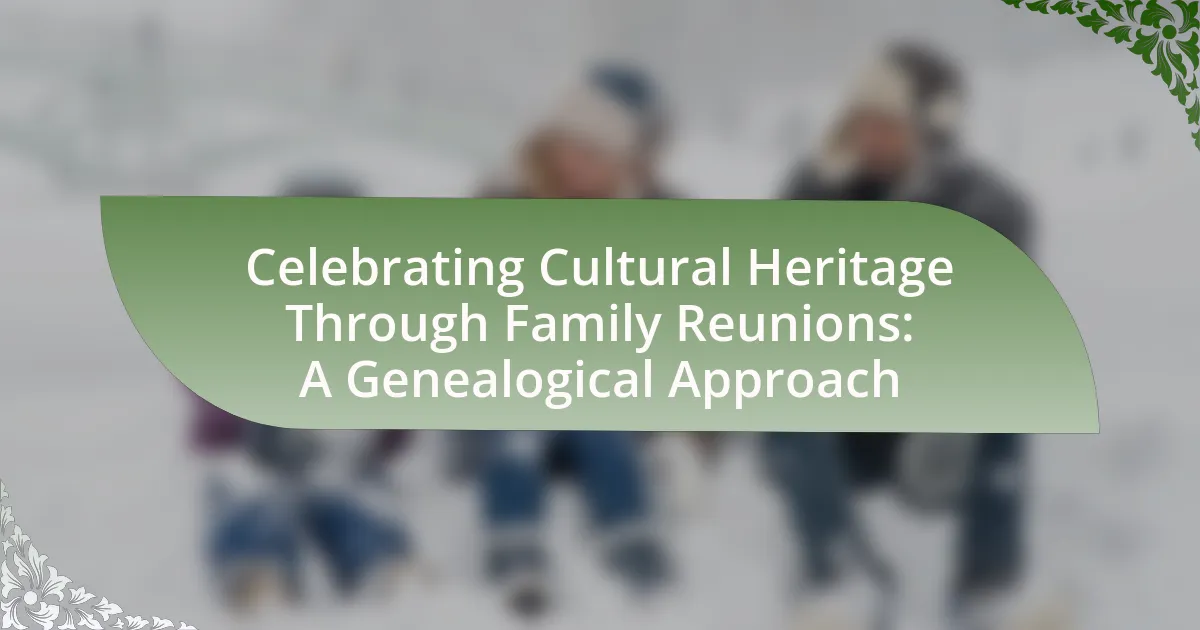The article “Exploring Indigenous Ancestry: Challenges and Opportunities in Genealogy” examines the unique aspects of Indigenous genealogy, emphasizing cultural heritage, oral histories, and tribal affiliation. It highlights the differences between Indigenous ancestry research and traditional genealogical methods, addressing the challenges posed by historical injustices, lack of records, and cultural sensitivities. The article also discusses the role of technology in enhancing research, ethical considerations, and best practices for engaging with Indigenous communities. Additionally, it outlines practical steps for individuals to begin their journey into Indigenous genealogy, emphasizing the importance of community ties and cultural integrity in the research process.
What are the key aspects of Indigenous ancestry in genealogy?
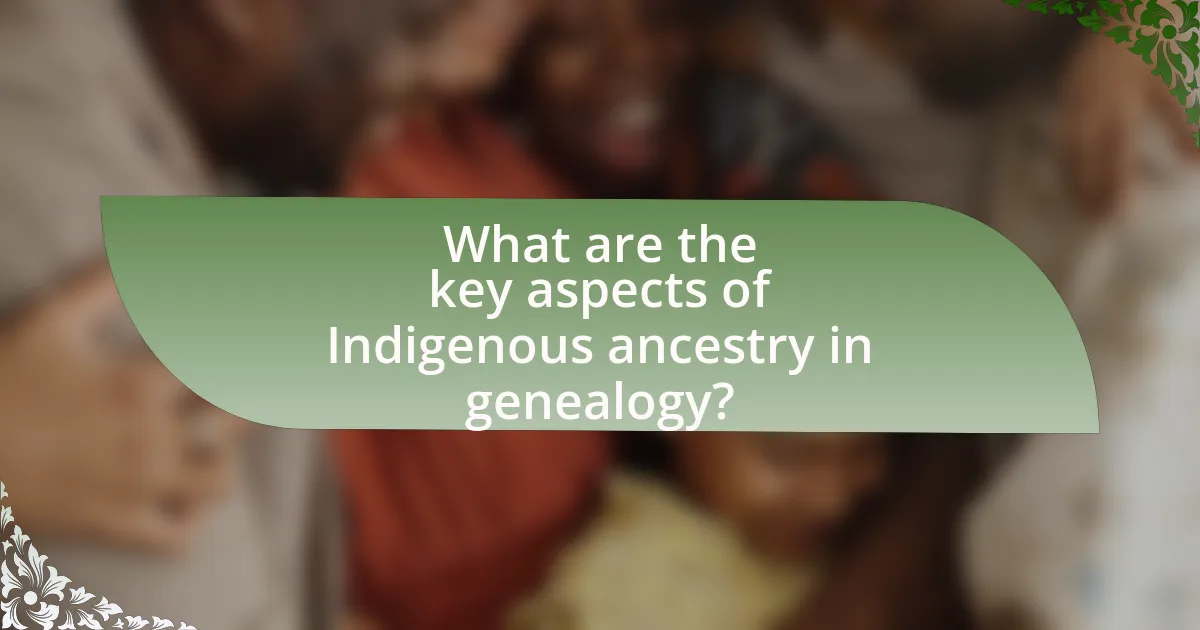
The key aspects of Indigenous ancestry in genealogy include the recognition of cultural heritage, the importance of oral histories, and the role of tribal affiliation. Cultural heritage is vital as it encompasses traditions, languages, and practices that define Indigenous identity. Oral histories serve as primary sources of information, often passed down through generations, providing insights that written records may not capture. Tribal affiliation is crucial for understanding lineage, as it connects individuals to their communities and ancestral lands, often influencing legal rights and benefits. These aspects highlight the unique challenges faced in Indigenous genealogy, such as the impact of colonization on record-keeping and the need for culturally sensitive approaches in research.
How does Indigenous ancestry differ from other genealogical research?
Indigenous ancestry differs from other genealogical research primarily due to its emphasis on cultural heritage, oral traditions, and community connections rather than solely on documented lineage. While traditional genealogical research often relies on written records such as birth certificates, marriage licenses, and census data, Indigenous ancestry research frequently involves understanding the significance of tribal affiliation, historical treaties, and the impact of colonization on family histories. This approach recognizes the importance of oral histories passed down through generations, which may not be formally documented but are crucial for understanding identity and belonging within Indigenous communities.
What unique cultural factors influence Indigenous genealogy?
Unique cultural factors that influence Indigenous genealogy include kinship systems, oral traditions, and community identity. Kinship systems dictate familial relationships and social structures, often extending beyond biological ties to include clan or tribal affiliations. Oral traditions serve as a primary means of passing down genealogical information, preserving histories and connections that may not be documented in written form. Additionally, community identity plays a crucial role, as genealogy is often tied to cultural heritage, land rights, and collective memory, reinforcing the importance of ancestry in maintaining cultural continuity. These factors collectively shape how Indigenous peoples understand and trace their lineage, emphasizing the interconnectedness of family, culture, and community.
How do oral traditions play a role in Indigenous ancestry?
Oral traditions are fundamental to Indigenous ancestry as they serve as the primary means of transmitting cultural knowledge, history, and lineage. These traditions encompass storytelling, songs, and rituals that preserve the identities and genealogies of Indigenous peoples across generations. For instance, many Indigenous communities rely on oral histories to recount the lives of ancestors, which helps maintain a sense of belonging and continuity within the community. Research indicates that oral traditions can provide insights into historical events, migration patterns, and familial connections that are not documented in written records, thereby enriching the understanding of Indigenous ancestry.
What challenges do researchers face when exploring Indigenous ancestry?
Researchers face significant challenges when exploring Indigenous ancestry, primarily due to the lack of comprehensive historical records and the complexities of tribal affiliations. Many Indigenous communities have oral histories rather than written documentation, which can lead to gaps in genealogical data. Additionally, researchers often encounter issues related to the sensitivity of cultural information and the need for permission from tribal authorities to access certain records. The historical context of colonization and forced assimilation further complicates the ability to trace ancestry accurately, as many Indigenous peoples were displaced or had their identities altered. These factors collectively hinder the ability to construct accurate genealogical narratives for Indigenous ancestry.
How do historical injustices impact genealogical research?
Historical injustices significantly hinder genealogical research by creating gaps in records and disrupting family lineages. For instance, the forced removal of Indigenous peoples from their lands often resulted in the loss of vital documents, such as birth and marriage certificates, which are essential for tracing ancestry. Additionally, systemic discrimination and policies, such as the Indian Act in Canada, led to the erasure of Indigenous identities and cultural practices, complicating the ability to accurately reconstruct family histories. These factors contribute to a fragmented understanding of ancestry, making it challenging for individuals to connect with their heritage and lineage.
What barriers exist in accessing Indigenous records and resources?
Barriers in accessing Indigenous records and resources include legal restrictions, lack of digitalization, and cultural sensitivity. Legal restrictions often arise from privacy laws and tribal sovereignty, which can limit access to certain records. The lack of digitalization means many records remain in physical formats, making them difficult to access, especially for those not located near repositories. Additionally, cultural sensitivity can create barriers, as some Indigenous communities may restrict access to their records to protect their heritage and traditions. These factors collectively hinder the ability to research Indigenous ancestry effectively.
What opportunities arise from exploring Indigenous ancestry?
Exploring Indigenous ancestry presents opportunities for cultural reconnection, identity formation, and community engagement. Individuals can gain a deeper understanding of their heritage, which fosters a sense of belonging and pride in their Indigenous roots. This exploration can also lead to the preservation of Indigenous languages, traditions, and histories, as families and communities work to document and share their narratives. Furthermore, engaging with Indigenous ancestry can open pathways for collaboration with Indigenous organizations and initiatives, promoting social justice and advocacy for Indigenous rights. Research indicates that individuals who explore their Indigenous ancestry often report enhanced mental well-being and a stronger sense of purpose, highlighting the personal benefits of such exploration.
How can genealogy strengthen Indigenous identity and community ties?
Genealogy can strengthen Indigenous identity and community ties by providing individuals with a deeper understanding of their ancestral roots and cultural heritage. This connection to lineage fosters a sense of belonging and continuity within the community, reinforcing shared histories and traditions. Research indicates that engaging with genealogy can enhance cultural pride and identity, as individuals learn about their ancestors’ experiences and contributions. For example, studies have shown that Indigenous peoples who actively participate in genealogical research often report increased engagement in cultural practices and community activities, thereby strengthening communal bonds and identity.
What role does technology play in enhancing Indigenous genealogical research?
Technology plays a crucial role in enhancing Indigenous genealogical research by providing access to digital records, databases, and tools that facilitate the discovery of ancestral connections. Digital platforms enable Indigenous individuals and communities to access historical documents, such as census records, land grants, and tribal rolls, which may have been previously difficult to obtain. For instance, initiatives like the National Archives and Records Administration’s digitization efforts have made millions of records available online, allowing for more comprehensive research. Additionally, genetic testing services offer insights into ancestry and can connect individuals with distant relatives, further enriching the genealogical narrative. These technological advancements empower Indigenous peoples to reclaim their heritage and strengthen community ties through informed genealogical exploration.
How can individuals begin their journey into Indigenous genealogy?
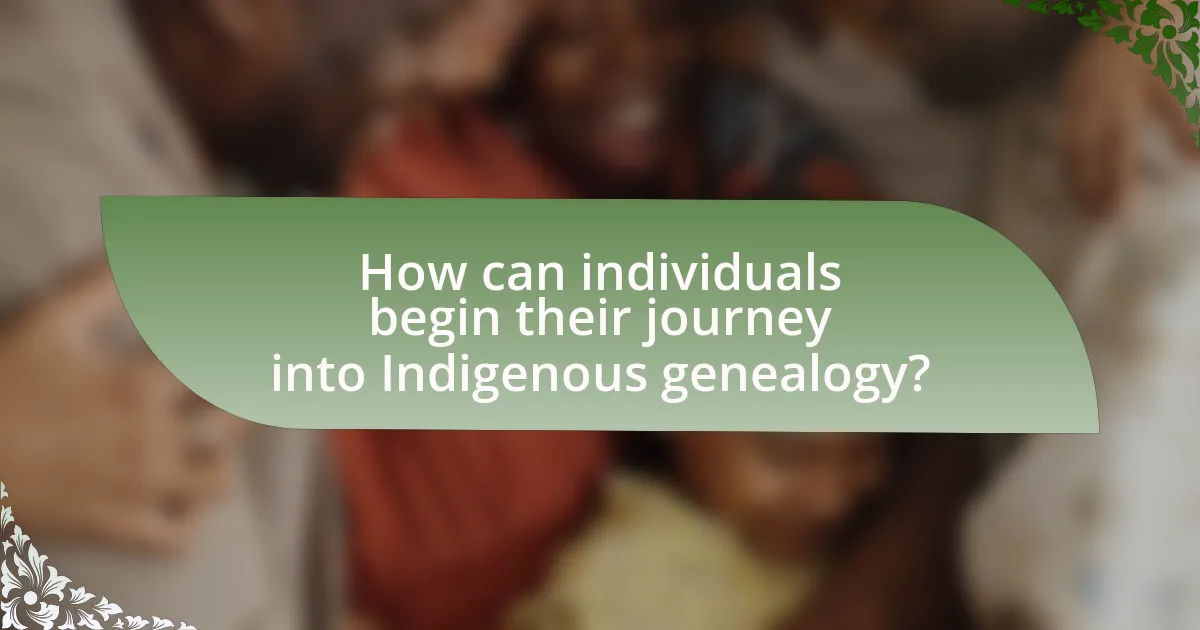
Individuals can begin their journey into Indigenous genealogy by gathering personal and family information, including names, dates, and places of birth. This foundational step allows individuals to create a family tree and identify potential Indigenous ancestry. Utilizing resources such as tribal enrollment offices, Indigenous genealogy websites, and historical records can provide further insights. Engaging with local Indigenous communities and organizations can also facilitate connections and access to culturally relevant resources. Researching specific tribal histories and understanding the unique genealogical practices of different Indigenous groups enhances the accuracy of the genealogy journey.
What initial steps should one take to explore their Indigenous ancestry?
To explore Indigenous ancestry, one should begin by gathering family history information, including names, dates, and places of birth from relatives. This foundational data helps establish a starting point for research. Next, individuals should consult tribal enrollment records or contact local Indigenous communities to seek guidance and access resources. Many tribes maintain historical documents that can provide insights into lineage. Additionally, utilizing online genealogy databases that specialize in Indigenous ancestry can yield valuable information. Engaging with Indigenous organizations or attending workshops can also enhance understanding and provide support in navigating the complexities of Indigenous genealogy.
How can individuals gather family history and oral stories?
Individuals can gather family history and oral stories by conducting interviews with family members, utilizing genealogical research tools, and participating in community events. Interviewing relatives, especially elders, allows individuals to capture personal narratives and cultural traditions that may not be documented elsewhere. Genealogical research tools, such as ancestry websites and public records, provide additional context and verification of family connections. Engaging in community events, particularly those focused on Indigenous heritage, fosters connections with others who may share similar backgrounds and stories, enriching the overall understanding of family history.
What resources are available for Indigenous genealogical research?
Resources available for Indigenous genealogical research include tribal enrollment records, historical documents, and specialized databases. Tribal enrollment records provide official documentation of lineage and membership, which is crucial for establishing ancestry. Historical documents, such as treaties, census records, and land allotment files, often contain valuable information about Indigenous families and their histories. Additionally, specialized databases like the National Archives, FamilySearch, and Ancestry.com offer access to digitized records and resources specifically focused on Indigenous populations, facilitating the research process.
What ethical considerations should be taken into account?
Ethical considerations in exploring Indigenous ancestry include respect for cultural heritage, informed consent, and the potential for exploitation. Respect for cultural heritage ensures that Indigenous communities’ histories and traditions are honored and not misrepresented. Informed consent is crucial when collecting genetic data or personal stories, as individuals must understand how their information will be used. The potential for exploitation arises when researchers or genealogists profit from Indigenous knowledge without benefiting the communities involved. These considerations are vital to maintain trust and integrity in genealogical research involving Indigenous peoples.
How can researchers respect Indigenous cultural sensitivities?
Researchers can respect Indigenous cultural sensitivities by engaging in meaningful consultation with Indigenous communities before conducting studies. This approach ensures that researchers understand the cultural context and values of the communities involved. For instance, the American Psychological Association emphasizes the importance of collaboration and obtaining informed consent from Indigenous peoples, which fosters trust and acknowledges their rights to their cultural heritage. Additionally, researchers should prioritize the use of culturally appropriate methodologies and be transparent about their intentions and the potential impacts of their research. This respect for Indigenous knowledge systems and practices is crucial for ethical research that honors the dignity and rights of Indigenous peoples.
What guidelines exist for sharing Indigenous genealogical information?
Guidelines for sharing Indigenous genealogical information emphasize respect for cultural sensitivity, privacy, and community consent. These guidelines often require individuals to seek permission from Indigenous communities before sharing genealogical data, as many Indigenous cultures have specific protocols regarding the dissemination of ancestral information. Additionally, it is crucial to acknowledge the historical context of colonization and its impact on Indigenous peoples, which informs their perspectives on sharing personal and communal histories. Following these guidelines helps ensure that the sharing of genealogical information is done ethically and in a manner that honors Indigenous traditions and values.
What are the best practices for successful Indigenous genealogical research?
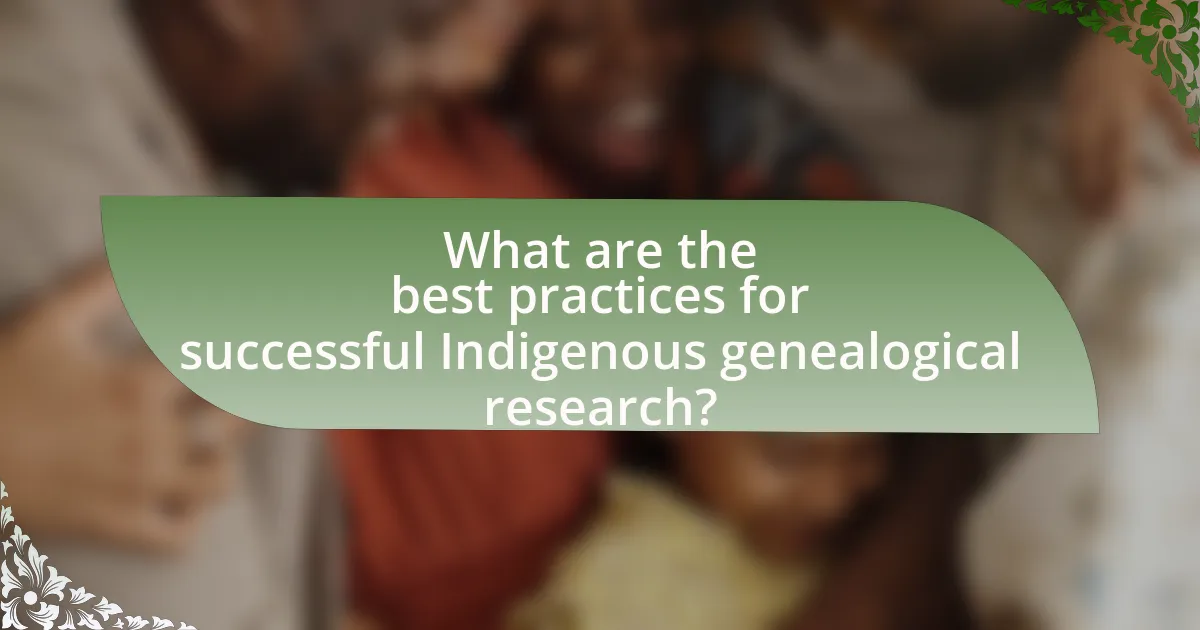
The best practices for successful Indigenous genealogical research include engaging with Indigenous communities, utilizing oral histories, and accessing specialized resources. Engaging with Indigenous communities fosters trust and provides valuable insights into family histories that may not be documented in written records. Utilizing oral histories is crucial, as many Indigenous cultures prioritize storytelling, which can reveal connections and details not found in official documents. Accessing specialized resources, such as tribal enrollment records and Indigenous genealogical databases, enhances the accuracy of research by providing verified information. These practices are supported by the recognition that Indigenous genealogical research often requires a culturally sensitive approach that respects the traditions and privacy of Indigenous peoples.
How can researchers effectively collaborate with Indigenous communities?
Researchers can effectively collaborate with Indigenous communities by prioritizing mutual respect, open communication, and the inclusion of Indigenous knowledge systems. Establishing trust through consistent engagement and recognizing the sovereignty of Indigenous peoples is essential. For instance, researchers should seek to understand the cultural context and historical experiences of the communities they work with, which can enhance the relevance and impact of their research. Additionally, involving community members in the research process, from planning to implementation, ensures that the research aligns with the community’s values and needs. This approach is supported by frameworks such as the First Nations Principles of OCAP (Ownership, Control, Access, and Possession), which emphasize the rights of Indigenous peoples over their data and knowledge.
What methods can enhance the accuracy of Indigenous ancestry research?
To enhance the accuracy of Indigenous ancestry research, integrating genetic testing with traditional genealogical methods is essential. Genetic testing provides concrete data on ancestry through DNA analysis, which can reveal connections to specific Indigenous populations. Combining this with oral histories and community records allows for a more comprehensive understanding of lineage and cultural heritage. Studies have shown that utilizing both genetic and genealogical approaches increases the likelihood of accurately identifying Indigenous ancestry, as evidenced by research published in the American Journal of Human Genetics, which highlights the importance of community engagement in interpreting genetic data.
How can researchers navigate the complexities of tribal affiliations?
Researchers can navigate the complexities of tribal affiliations by engaging directly with tribal communities and utilizing culturally sensitive methodologies. Establishing relationships with tribal leaders and members fosters trust and ensures that research aligns with community values and perspectives. Additionally, researchers should familiarize themselves with the historical context and legal frameworks surrounding tribal identities, such as the Indian Reorganization Act and the criteria for tribal enrollment. This understanding aids in accurately interpreting genealogical data and recognizing the significance of oral histories within tribes. By prioritizing collaboration and respecting tribal sovereignty, researchers can effectively address the intricacies of tribal affiliations in their work.
What common pitfalls should be avoided in Indigenous genealogy?
Common pitfalls to avoid in Indigenous genealogy include relying on inaccurate or incomplete records, which can lead to misidentification of ancestors. Many Indigenous communities have oral histories that may not align with written documentation, creating discrepancies. Additionally, researchers should be cautious of cultural appropriation and ensure they have permission to access and share Indigenous knowledge. Misunderstanding the significance of tribal enrollment criteria can also result in incorrect lineage claims, as each tribe has its own rules for membership. Lastly, overlooking the importance of community engagement can hinder the accuracy of genealogical research, as local knowledge is often crucial for understanding family connections.
How can misinformation be identified and addressed?
Misinformation can be identified and addressed through critical evaluation of sources and cross-referencing information. Individuals should verify the credibility of the source by checking the author’s qualifications, the publication’s reputation, and the presence of citations or references. For example, a study published in the Journal of Communication found that fact-checking and source verification significantly reduce the spread of false information. Addressing misinformation involves educating the public on media literacy, promoting awareness of reliable resources, and encouraging open discussions to clarify misconceptions.
What strategies can help maintain cultural integrity in research?
To maintain cultural integrity in research, it is essential to engage with Indigenous communities throughout the research process. This includes obtaining informed consent, respecting traditional knowledge, and ensuring that the community’s perspectives and values are integrated into the research design and outcomes. Engaging with community leaders and members fosters trust and ensures that the research aligns with cultural practices and beliefs. Additionally, researchers should prioritize transparency in sharing findings with the community and allow for community input on how the results are disseminated. This approach is supported by the principle of reciprocity, which emphasizes mutual benefit and respect in research relationships.
What practical tips can assist in exploring Indigenous ancestry?
To explore Indigenous ancestry effectively, individuals should start by gathering family records, such as birth certificates, marriage licenses, and oral histories. These documents often contain vital information about lineage and connections to Indigenous communities. Engaging with local Indigenous organizations and tribal offices can provide access to resources and guidance on specific ancestry research methods relevant to particular tribes. Additionally, utilizing online databases and genealogy websites that specialize in Indigenous ancestry can yield valuable insights and connections. Researching historical treaties and land records can also reveal ancestral ties to specific regions and tribes, enhancing the understanding of one’s Indigenous heritage.
